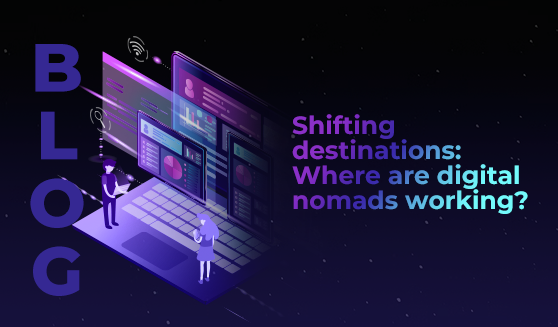
The rise in global internet penetration, along with major improvements in mobile connectivity with the advent of 4G and 5G, have enabled a generation of digital nomads. According to data from Digital Nomad, there are about 35 million digital nomads worldwide in 2023 – and 47% of them are from the United States.
They can work anywhere – and yet digital nomads do have certain requirements for connectivity and work spaces (from co-working hubs to laptop-friendly cafes with fast WiFi), so location trends emerge and change over time.
Where are digital nomads choosing to work right now – and why?
Mountain towns in China
An article from Reuters drew our attention to the fact that digital nomad destinations are changing. In Dali, a remote mountain town in southwest China, entrepreneurs are busy at work in co-working spaces and cafes; gathering to share ideas, and opening laptops to earn a living.
Minhua Ling (an expert of Chinese migration at the Geneva Graduate Institute) told Reuters that the Old Town district of Dali has been a hub for culture workers since the 1990s; and since the rise of remote working during the COVID-19 pandemic, it’s become even more popular among those whose jobs aren’t location-specific.
Workers are finding a sense of community and refuge in a place that’s removed from some of the norms of the country’s mainstream society, and exploring new ideas with like-minded peers.
A digital nomad visa in Portugal enables remote-working
Digital nomads who want to work outside of their country of residence face numerous visa and right to work challenges. But as of October 2022, Portugal has introduced a dedicated Digital Nomad Visa to make it easy for higher earners to live in the country and drive local economic stability.
The visa is available to foreign nationals who earn four times the national minimum wage (about USD $3,350 per month), and allows them to live and work in the country for up to one year – when they can then apply for residency if they wish to stay longer. This means that remote workers can tick Portugal off their long-stay travel bucket list, or have the opportunity to experience living there before they decide if they want to commit to more permanent residency.
But it’s not the only country that offers a Digital Nomad Visa
A total of 58 countries now offer visas for digital nomads. They include popular locations like…
- Greece
- Barbados
- Mexico
- Costa Rica
- The UAE (with a digital nomad visa scheme for Dubai)
- Iceland
…and more.
Mexico is among the most affordable destinations, and connectivity improvements have made it popular
With a relatively low cost of living, digital nomads in Mexico enjoy a busy, vibrant lifestyle – with the opportunity to save more of their income. High-speed internet access is readily available here, and there’s a growing community of remote workers taking advantage of it.
Connectivity in Mexico has improved significantly over the last few years – and it’s been a major catalyst for growth in the country’s digital economy. Data from the International Trade Administration shows that e-commerce in Mexico grew by 27% in 2021 (compared to the previous year), and it has ranked in the top five countries globally for e-commerce growth for the past three years.
At the end of 2021, Mexico had 89.5 million internet users – that’s 75.7% of the population over the age of six. The government has prioritised providing universal connectivity with a program called Internet para Todos (run by a subsidiary of the Federal Electricity Commission), which aims to provide internet services in rural areas and under-served communities.
What do digital nomads bring to a local economy?
The increase in the number of countries offering specific digital nomad visas is evidence that more governments around the world are recognising the benefits of remote workers for their own societies.
Those benefits include:
- Economic boost: With capital spent on living accommodation, local eateries and services, co-working spaces, and other local services, digital nomads can provide local economies with a valuable injection of revenue. One study found that digital nomads often spend more than 35% of their income locally. They can also drive job creation as the demand for local services increases – for example, in the hotel and tourism industries.
- An exchange of talent and cultural insight: People who choose to work nomadically tend to be open-minded, curious, and interested in discovering local cultures and customs. They bring with them experience and insights from different sectors and cultures, and can support the development of local talent – driving the transfer of knowledge, and the possibility for innovation.
- Investment in the local area: Digital nomads who choose to live and work in underdeveloped areas may choose to invest in the growth and development of that location – for example, directing funds and international attention towards local projects, services, or communities in need of capital.
Non-location specific workers are attracted to locations that offer good connectivity infrastructure, local culture and heritage to pique their curiosity, and work-friendly settings – like transportation services, accommodation, and co-working spaces. And areas that offer those services can benefit from the influx of capital, talent, and culture-sharing that digital nomads bring.
It’s one of the growing benefits of our connected world. And we’re excited to see the opportunities that digitally nomadic work brings in the future – both for the workers and for the places where they choose to power up their laptops.








